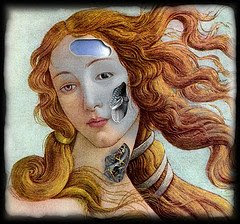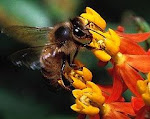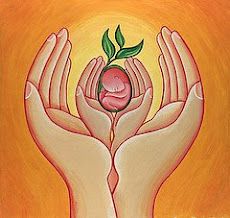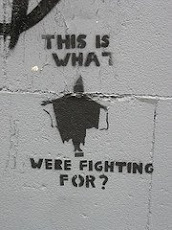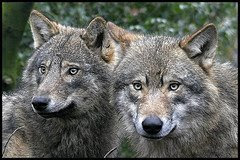Instructions
- Read three extracts presented below from Margaret Somerville's books The Ethical Canary and The Ethical Imagination, and ONE of the two extracts from Benjamin Hoff's work, The Tao of Pooh.
- Then answer just ONE question.
- Write no more than 100 -150 words.
- Use a neutral style as studied in class (i.e. with Anglo-Saxon words and contractions).
- When you have finished submit it as a comment to this blog post.
- Margaret Somerville has kindly agreed to have a look at your ideas.
"Our contemporary search for ethics shows, I believe, that we are becoming much more sensitive than have been to [the] threats to our human spirit - the deeply intuitive sense of relatedness or connectedness to all life, especially other people, to the world, the universe and the cosmos in which we live; the intangible, invisible, immeasurable reality that we need to find meaning in life and make life worth living. In short, the human spirit is the metaphysical reality (that which is beyond the physical) that we need to fully live fully human lives." (Somerville, 2000, p.2)
"One manifestation of the human spirit or human spirituality is the longing for transcendence - the strong desire to experience the feeling of belonging to something larger than ourselves." (Somerville, 2009 p.8)
I believe our most authentic selves are to be found in the complex interactions of knowing ourselves, relating to others, appreciating our place in the great web of life, and seeing ourselves as part of the earth, the stars, the universe, and the cosmos. Some scientists tell us that we came from stardust - the earliest forms of life on earth might have arrived in meteorites that crashed; to rephrase the Ash Wednesday liturgy, "Remember man thou art stardust and into stardust thou shalt return." That fact, assuming that it will prove to be correct, and the idea that science can verify it, is astonishing and wondrous. The acute and continuous awareness of a mind-blowing web of relationships - that is what I call the human spirit. (Somerville, 2009 pp 56-57)
***
"They walked on thinking This and That, and by-and-by they came to an enchanted place on the very top of the Forest called Galleons Lap, which is sixty-something trees in a circle; and Christopher Robin knew that it was enchanted because nobody had ever been able to count whether it was sixty-three or sixty-four, not even when he tied a piece of string round each each tree after he had counted it. Being enchanted, its floor was not like the floor of the Forest, gorse and bracken and heather, but close-set grass...Sitting there they could see the whole world spread out until it reached the sky, and whatever there was all the world over was in them in Galleons Lap."
Extract by A.A.Milne cited in Hoff (1982, p.152)
"To Lao-tse (LAOdshuh), the harmony that naturally existed between heaven and earth from the very beginning could be found by anyone at any time, but not by following the rules of the Confuscianists. As he stated in his Tao Te Ching (DAO DEH JEENG), the "Tao Virtue Book," earth was in essence a reflection of heaven, run by the same laws - not by the laws of men. These laws affected not only the spinning of distant planets, but the activities of the birds in the forest and the fish in the sea. According to Lao-tse, the more we interfered with the natural balance produced and governed by natural laws, the further away the harmony retreated into the distance. The more forcing, the more trouble. Whether heavy or light, wet or dry, fast or slow, everything had its own nature already within it, which could not be violated without causing difficulties. When abstract and arbitrary rules were imposed from the outside, struggle was inevitable. Only then did life become sour.
To Lao-tse, the world was not a setter of traps but a teacher of valuable lessons. Its lessons, just as its laws needed to be followed; then all would go well. ...What he saw operating behind everything in heaven and earth he called Tao (DAO) "the Way". A basic principle of Lao-tse's teaching was that this Way of the Universe could not be adequately described in words, and that it would be insulting to both its unlimited power and to the intelligent human mind to do so. Still, its nature could be understood ..."
Extract from The Tao of Pooh by Benjamin Hoff
Questions
Answer EITHER question 1 OR question 2
1) What do the 'enchantment' in the forest described in Hoff (1989) and the the 'human spirit' defined in Somerville (2000) have in common?
2) Compare the Tao and the 'Human Spirit'. Do you think they are the same thing?
References
Hoff, B (1982) The Tao of Pooh. Egmount. London.
Somerville, M (2000) The Ethical Canary. Science, Society and the Human Spirit. McGill-Queen's University Press. Montreal
Somerville, M (2009) The Ethical Imagination. Journeys of the Human Spirit. McGill-Queen's University Press. Montreal
***
Student Responses:
For Margaret Somerville, in the Ethical Canary (2000), the human spirit is "the deeply intuitive sense of relatedness or connectedness to all life, especially other people, to the world, the universe and the cosmosin which we live". Even though the Tao explains that everything is related and in harmony due to the rules of nature, Lao tse cleary explains that being connected to other people is a mistake(unless no form of authority arises), because it leads to the loss of the path (Tao). Indeed, asking a question would be an insult to the laws of the universe, trying to explain them by words."The Way that can be described is not the true Way." (Tao Te Ching). At the same time, answering quesitons would imply reverting to the same level as the person that did ask, because Taoism states that everybody can achieve enlightenment, but needs to escape from the human world, that has put human rules to nature,therefore going further away from harmony and connectedness to the universe. Somerville's definition of the human spirit is more Confucianist than Taoist; indeed, in the Three Jewels of Tao, it is said that the way can only be found by a"refusal to assert active authority".
Sebastien
***
Dear Margaret,
I have read your writings about the Human Spirit, and also the ones of Lao-tse about the Dao. I would say that even if both texts deal with the idea of an intangible law which links all of us, they are not describing the same thing.
Lao-tse talks about it as if it was a divine rule that runs the entire world and out of which we should learn. Whereas, you see the Human Spirit as an achievement for human beings, finding the right way to lead our lives. I would say that according to you this law already exists for the human beings and it is our duty to respect it. However, in Lao-tse’s view: we should create our own way of life watching the world running around us.
Best regards
Richard


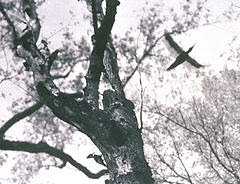




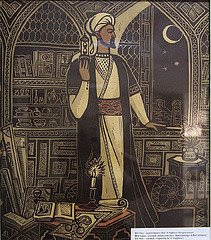+II+-+socialist+art+by+night+_eulen.jpg)
